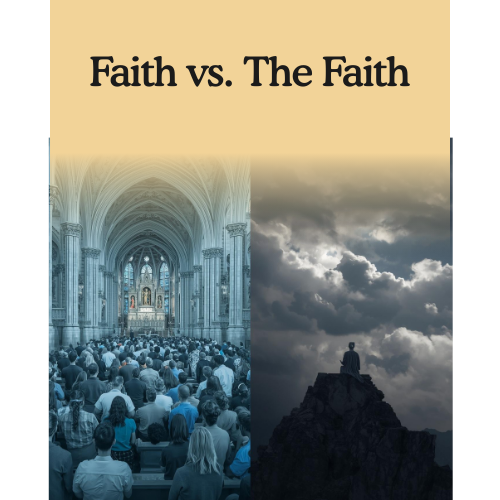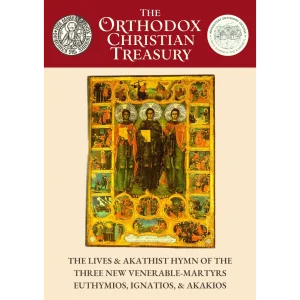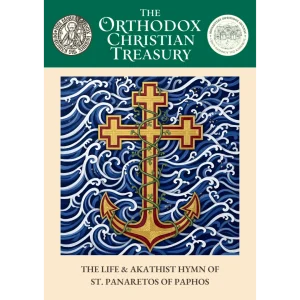Will He find THE Faith?… Matthew 24:13

by Bishop Philaretos
“Will He find the Faith…” — Why the Greek Article Matters
In Luke 18:8, Christ ends the Parable of the Unjust Judge with a piercing question:
“When the Son of Man comes, will He find the faith on the earth?”
Many modern translations render this as “faith”, without the definite article—softening the Lord’s point to a general sense of trust or religious sentiment. But the Greek text says something far more specific and far more alarming:
τὴν πίστιν — the Faith.
Christ does not ask whether He will find personal trust, religiosity, or spiritual sentiment on earth.
He specifically asks whether He will find τὴν πίστιν—the one, identifiable, apostolic, doctrinal Faith. The Meaning and Urgency of τὴν Πίστιν in the Last Days
In the Gospel of Luke, the Lord ends the Parable of the Unjust Judge with a striking and painful question:
“When the Son of Man comes, will He find the faith on the earth?”
(Luke 18:8)
In Greek, this reads:
«ὁ Υἱὸς τοῦ ἀνθρώπου ἐλθὼν ἄρα εὑρήσει τὴν πίστιν ἐπὶ τῆς γῆς;»
This small phrase—τὴν πίστιν—is not a minor detail but the key to understanding the Lord’s prophecy. It is often rendered in English simply as “faith,” but this loses the meaning of the original. The Greek includes a definite article: the Faith. Not generic belief, not spiritual feeling, not religious sincerity, but the one, identifiable, apostolic, Orthodox Faith, delivered once for all to the saints.
Christ does not ask whether people will still be “spiritual.” He asks whether there will remain on earth the very Faith He Himself planted through the Apostles.
Many Fathers stress that the Parable of the Unjust Judge itself is not chiefly about an immoral civil magistrate, but about the earthly face of the Church in times of spiritual decline. The judge who “neither feared God nor regarded man” (Luke 18:2) represents not God, but the condition of the hierarchy and the visible institution when it becomes worldly, indifferent, and unresponsive to the cries of the faithful. The widow symbolizes the persecuted Church—the faithful remnant—crying out day and night for justice, purity, and the vindication of truth. Christ is teaching that in the last days, even within what might appear to be the “church” in outer structures, there will be coldness, bureaucracy, and spiritual negligence; yet God Himself will answer His elect speedily, vindicating those who persist in prayer and in confessing The Faith.
The Fathers repeatedly say concerning “the Faith”:
St. Cyril of Alexandria: “He speaks not of general belief but of the true Faith, undefiled.” (Greek commentary on Luke 18:8):
«Οὐ περὶ τῆς κοινῆς πίστεως λέγει, ἀλλὰ τῆς ἀληθινῆς καὶ ἀμιάντου πίστεως· ταύτην ὀλίγην εὑρεθήσεσθαι σημαίνει.»
Translation:
“He does not speak of common belief, but of the true and undefiled Faith; He indicates that this will scarcely be found.”
This comment is decisive. Christ is not concerned with religiosity, but with the preservation of the Orthodox confession—the right doctrine, the right worship, the right spiritual life—against the tidal waves of apostasy.
St. Basil laments conditions in his own century (4th century!), saying:
“The dogmas of the Fathers are despised; the apostolic traditions are set at naught; the inventions of innovating men are in vogue in the Churches… The noble are fleeing. The people are in confusion.” (St. Basil the Great, Epistle 90, PG 32, 484–485),
If St. Basil spoke this way in the age of the great Ecumenical Councils, how much more in our own age—of ecumenism, secularization, modernism, and spiritual indifference? Ἡ πίστις ἡ ἀληθινὴ οὐκ ἐστὶν ἁπλῶς πίστις, ἀλλ’ ὀρθὴ δόξα καὶ ὁμολογία.»
“True faith is not simply belief, but right doctrine and confession.” (St. Basil the Great, On the Holy Spirit 10:24, PG 32:136A).
Greek: «Ἡ πίστις ἡ ἀληθινὴ οὐκ ἐστὶν ἁπλῶς πίστις…»
Here again, the Fathers distinguish between:
πίστις — “belief” or “religiosity” in general and ὀρθή πίστις, ὀρθὴ δόξα, ἀληθινὴ πίστις — the Orthodox Faith, the exact confession, the apostolic and saving doctrine.
St. John Chrysostom: “He means the right Faith, the exact teaching delivered once for all.”
«Οὐ γὰρ ἀρκεί τὸ πιστεύειν μόνον· δεῖ τῆς ὀρθῆς πίστεως, ἥτις ἐστὶν ἡ τῶν Ἀποστόλων παράδοσις.»
Translation:
“It is not sufficient merely to believe; one must have the right Faith, which is the Tradition of the Apostles.” (St. John Chrysostom, Homily III on 1 Timothy (PG 62:513))
St. Theophylact of Ochrid: “Not mere belief, for even demons believe; but the Orthodox confession.”
In other words, Christ is asking:
Will the Orthodox Faith still exist recognizably on earth when I return?
St. Theophylact connects Christ’s question about the Faith with the Apostle James’ statement that “even the demons believe” (Jas. 2:19). He writes:
«Καὶ οἱ δαίμονες πιστεύουσι καὶ φρίσσουσιν· ἀλλ’ οὐκ ἔχουσι τὴν ὀρθήν πίστιν, οὐδὲ τὴν κατ’ ἀλήθειαν ὁμολογίαν.»
“Even the demons believe and tremble; but they do not have the right Faith, nor the true confession.”
And commenting on Luke 18:8 itself, he clarifies what Christ means by “faith”:
«Πίστιν δὲ λέγει τὴν ἀληθῆ καὶ ὀρθήν· οὐ γὰρ ἀρκεῖ τὸ μόνον πιστεύειν…» (St. Theophylact of Ohrid, Commentary on Luke 18:8 (PG 123–126).
Greek: «Πίστιν δὲ λέγει τὴν ἀληθῆ καὶ ὀρθήν…»)
“By ‘faith’ He means the true and right faith; for it is not enough merely to believe…”
Thus, St. Theophylact confirms explicitly that the Faith (τὴν πίστιν) refers to the Orthodox confession, not belief in a general or emotional sense. (St. Theophylact of Ohrid, Commentary on James 2:19, PG 125:122C.).
In other words, Christ is asking:
Will the Orthodox Faith still exist recognizably on earth when I return?
The Apostasy and the Corruption of the Faith
The Lord in Matthew 24:13 warns of deception so great that even the elect would be led astray “if it were possible.”
The crisis of the last times is not moral first—it is dogmatic.
This is why:
St. Anthony the Great said a time will come when “the truth of the Faith will be hidden.”
St. Ignatius Brianchaninov said the last great battle of the Church will be unmasking deception.
St. Seraphim of Sarov spoke of the “withering of true Orthodoxy.”
The Church will not disappear—but it will be reduced to a remnant.
Faith vs. The Faith
“Faith” (lowercase) can include:
Generic belief in a higher power
Emotional religiosity
Sincerity without truth
The Faith (capital F) is:
Apostolic dogma
The seven Ecumenical Councils
The Orthodox phronema
The true worship of the Holy Trinity
The unbroken spiritual lineage
Christ’s question is therefore not about the quantity of believers, but the quality and authenticity of their confession.
For the True Orthodox this verse prophetic. We witness:
Churches teaching a different Christ
Hierarchs endorsing syncretism
The erosion of asceticism
The replacement of repentance with psychology
The collapse of spiritual vigilance
Therefore this verse is not an abstract warning—it is describing our age.







